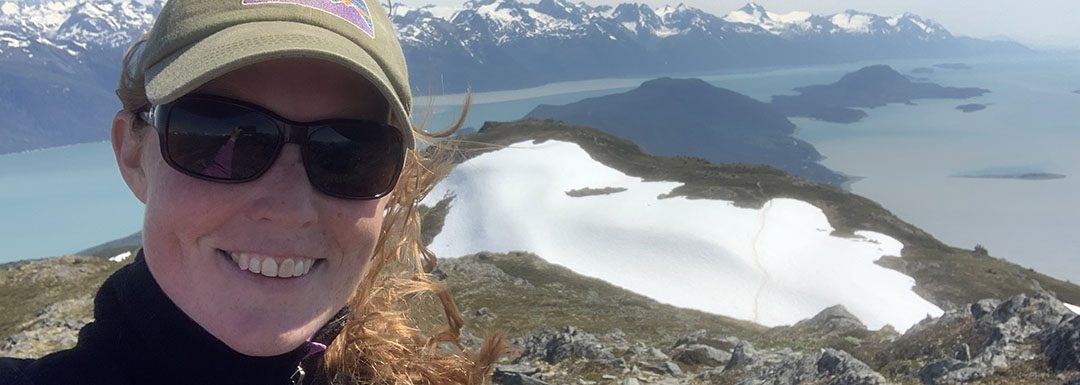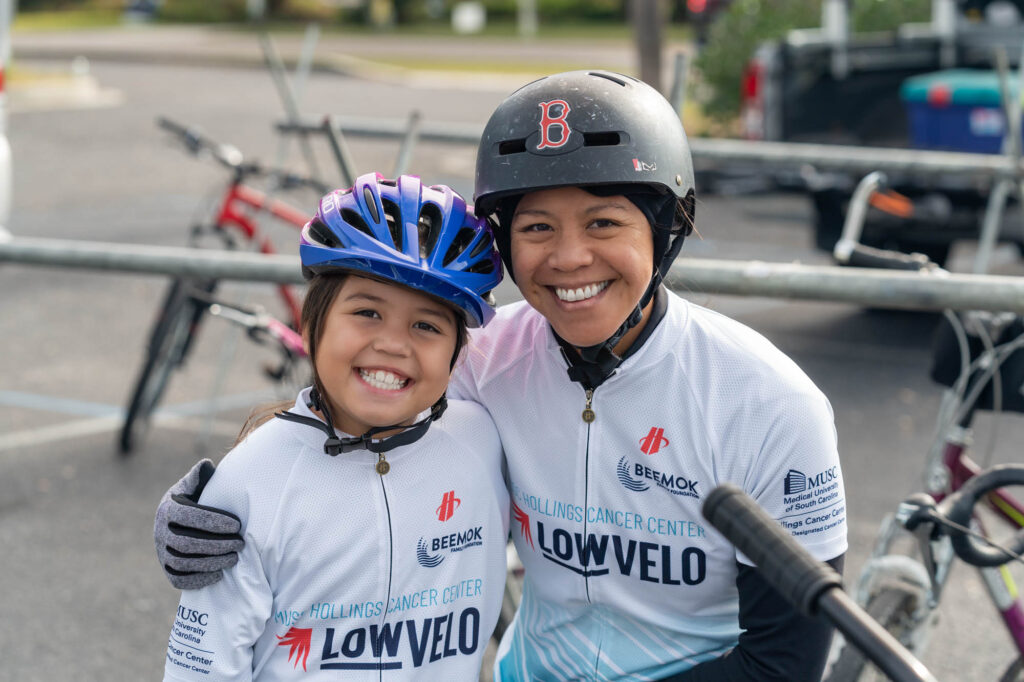LOWVELO'S Alaskan Participant Fishes for Halibut and Contends with Bears

Lucy Boyce, an MUSC Hollings Cancer Center employee who works remotely from Alaska, is logging her LOWVELO miles on scenic hiking trails.
With this year’s LOWVELO event going virtual, the cancer fundraising campaign for MUSC Hollings Cancer Center(opens in a new tab) is attracting participants from across the nation. So far, Lucy Boyce, one such participant, lives the farthest away from Hollings. In the following Q&A, she shares what drew her to join as a hiker. The cycling, walking, running event, which runs through Nov. 14, now has participants from 23 states. The goal is to have someone join from all 50.
When Boyce isn’t logging miles for LOWVELO or working remotely for Hollings, she can be found halibut fishing, hiking and navigating life in the wilds of Alaska. Her interview for this piece was interrupted so she could chase a bear out of her cherry tree.
Why did you register?
I have personally witnessed the dedication of the oncology care team at Hollings. I registered to bring awareness and support so they have the tools necessary to change lives.
What is it like to be our most remote participant in the U.S.?
Joining LOWVELO felt like creating a door that magically connected Alaska and South Carolina. With the global pandemic, I have seen an increased number of virtual platforms, including LOWVELO. Expanding this community and accepting me, among so many others, is a beautiful way to bring MUSC to Alaska and bring Alaska to MUSC.
What do you do for Hollings?
I work for the Hollings Tumor Registry. I worked three years onsite with the team in Charleston and now am operating remotely from Alaska. We collect diagnostic and treatment information from Hollings Cancer Center. This data is available to guide and support research from the local to the national level.
Why live in Alaska?
I was born and raised in Alaska, so it’s not a stretch to say it means home and family. I met my now husband, a Charleston, South Carolina, native, working on small expedition cruise boats. We settled in West Ashley, and for nearly 10 years, I had the gift of experiencing a very different environment. This has given me a deeper and broader understanding of what home and family mean.
While I am naturally drawn to the wild openness of these coastal mountains, the reasons to live in Alaska are much like the reasons to live in South Carolina. Biking along the salmon-spawning rivers in Alaska brings me the same peace I found biking through the saltwater marshes of the Greenway. Meeting friends at a mountain trailhead feels very much like the family of women I found at the local Charleston gym. Calling a friend to harvest cherries so the bears don’t break the trees was reminiscent of a time not so long ago when I called on someone to help lash things down prior to a tropical storm.
What are some of your favorite anecdotes about living there?
The cabin I grew up in is on a mountain. When my father first purchased the property, the only placement for the driveway was straight up. In the summer, it is a four-wheel-drive-only route. In the winter, it’s worth praying about. The first major bend of the driveway is along the Alaska Highway, which makes “getting a run” at the steeper part nearly impossible. The second major bend is under a massive spruce tree, on top of bedrock and along a creek that jumps the ditch and glaciates the entire turn. At some point, the road becomes truly impassible, and one is forced to hike an alternate trail the 100 or so vertical feet to the cabin. The ride home from school became eerily quiet as we approached the driveway. Nobody wanted to jinx the chance that maybe, if we all pretended not to care, Mum would try to make it up twice before parking at the bottom.
My husband Billy and I live, in the summer, in my childhood cabin. This year, after multiple plumbing failures, we decided to install new pipes and fittings. A couple hours into this project, Billy returned from under the house saying that he had seen where a light bulb must have gotten too close to some of the wooden supports, and he could see singe marks. I dove under to investigate and reemerged laughing. Those are not from a light bulb, I told him. It’s where Dad used a blow torch to thaw the pipes.
How do you stay active and healthy?
I say “yes” as much as possible. Walking dogs in the rain? Sure. Hiking on a blisteringly hot day? Absolutely. Snowshoeing in driving snow? Sign me up. We are a town with a small population and a large geographic area. Playing outside is a way to connect with friends and learn about the place I live.
How do you get the bears out of the cherry tree?
The short answer is — you don’t. It’s an annual game of chicken — who waits long enough for the berries to ripen but not too long so that you’re too late. You or the bear? On a year with a late salmon run, the bears are hungry. They’re targeting unripe berries, and no amount of yelling, banging (and throwing!) pots and pans or setting off firecrackers is going to get them out of the trees. So, this year, I got out the chainsaw and clippers, cut down the broken trees, pruned the cracked branches and contemplated a more sustainable plan.
Now that my husband and I are here full time, we have invested in an electric fence. Only time will tell if this is effective. As for getting safely from the cabin to my car — starting in May, my purse content includes (along with my wallet, keys and phone) pepper spray and an airhorn. Coffee-shop advice routinely centers on what caliber is the best to carry for protection.
Why are you so passionate about supporting cancer research?
My experience working in the Tumor Registry has given me a chance to understand more fully what cancer means. Diagnostic and treatment recommendations are based on strength of evidence: what often works, the test most likely to identify the problem, etc. The recommendations for a child with leukemia are going to be vastly different than an adult with a solid lung tumor. The number of iterations of cancer are as numerous as those who fight them. Patients deserve the most current recommendations, from the most pertinent evidence, for their specific situation. For this reason, supporting research for all types of cancer is vital and must be ongoing.


